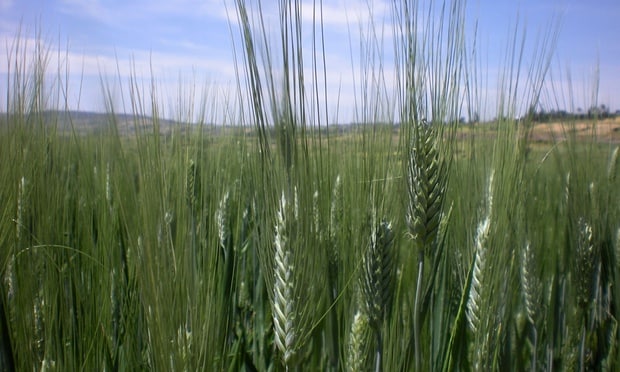An Ethiopian wheat farm. Photograph: Kirubel Tadesse Ayetenfisu/AP
The World Bank’s head of agriculture and food security speaks of a “frustrating lack of attention paid to agriculture” at the climate talks and calls for advances in climate-smart farming.
First, there is a frustrating lack of attention paid to agriculture in the current global climate talks leading up to the Paris conference later this year. By definition, food production affects all countries, rich and poor, and it is hard to imagine any effective post-Kyoto climate change agreement that ignores 25% of the problem. So, we need a climate change agreement where agriculture is a big part of the solution, and delivers a triple win: higher agricultural productivity to feed more people and raise the incomes of poor farmers - especially women, greater climate resilience, and reduced greenhouse gas emissions.
Second, we still grow our food largely using 20th century technology - over 100 years old in the case of fertilizer production! We need more and better agricultural research to bring farming into the 21st century. Other sectors like energy have made great breakthroughs in remarkably short periods of time, but where is the “electric car” for agriculture? The Copenhagen Consensus concludes that agricultural research is one of the single most effective investments we could make to fight malnourishment. Therefore, we need more support for bodies like the Consultative Group on International Agricultural Research that focus on crops and cropping systems that are of greatest importance to poor farmers and poor countries. Such research is a global public good that the private sector cannot be expected to deliver alone.
Third, agriculture, like other sectors, ‘wastes’ carbon because we don’t price it properly. Carbon pricing is an essential way to cut greenhouse gas emissions and lower climate risks. Whether through carbon markets, carbon taxes, or performance measures, a price on carbon can drive investment toward a greener agriculture, a cleaner economy and ultimately, more food for all.
Fourth, agriculture today consumes 70% of the world’s fresh water, and too much of it is wasted. We must become wiser about water, especially because of climate change. One example of better water management is in rice cultivation. Growing rice can use enormous quantities of water, but new farming techniques, like those developed by the CGIAR, can drastically reduce water use and also reduce the amount of methane from rice cultivation.
Hunger has many causes, including ignorance and injustice and violence, and there is no single solution that will guarantee that every person, every day, everywhere, has enough to eat. But, as incredulous as it sounds, even though one in nine people go hungry today, it is within our power to eliminate extreme poverty and hunger by 2030. We can build a better food system, based on climate smart agriculture that will grow more food, raise farmer incomes, and protect our land, water and biodiversity. And we can eliminate world hunger.
If the sustainable development goals and COP 21 in Paris are opportunities to come up with bold ideas to tackle poverty, reduce inequality and address climate change, then climate smart agriculture should be acknowledged as one of those ideas that will enable us to do all three in one.
Mark Cackler is manager for agriculture and food security at the World Bank.
Food for Thought is a monthly series curating ideas on achieving the goal of zero hunger from leaders across the private, public and charity sectors. Get in touch to contribute.
Join our community of development professionals and humanitarians. Follow@GuardianGDP on Twitter.









